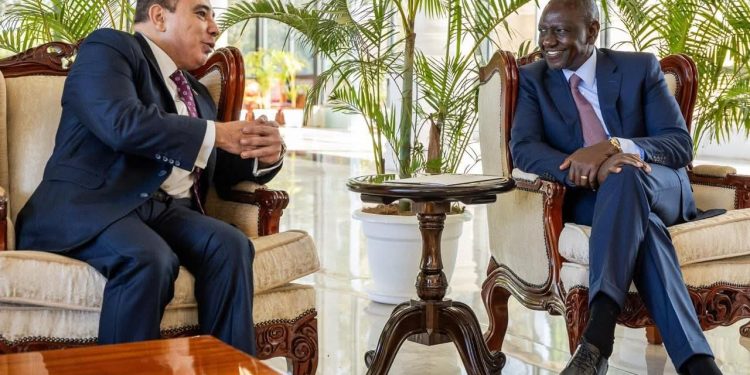When President William Ruto stepped onto Egyptian soil in January 2025, history was not just remembered—it was renewed. His visit, the first-ever State Visit by a Kenyan President to Egypt, marked a milestone in a relationship that began long before either nation gained independence.
It was a journey that started with a shared dream of liberation and has evolved into a dynamic partnership shaping Africa’s future.
The roots of Kenya-Egypt relations stretch deep into the era of anti-colonial struggle. In the 1950s and early 1960s, as Kenya fought for self-rule, Egypt became a sanctuary for freedom fighters.
Cairo was more than just a capital city; it was a beacon of hope. Leaders like Oginga Odinga, Tom Mboya, and James Gichuru found refuge there after colonial authorities revoked their travel documents.
In a symbolic gesture of solidarity, Egypt granted some of them diplomatic passports, enabling them to champion Kenya’s cause globally.
Radio Cairo’s “Voice of Africa” broadcast in Kiswahili, amplifying the call for independence across the continent. Even the Coptic Orthodox Church joined the resistance, paying a heavy price as its clergy faced detention for preaching anti-colonial messages. Kenya never forgot these sacrifices—proof that the friendship was built on more than diplomacy; it was cemented in shared ideals.
Fast forward to the present, and the relationship between these two nations has blossomed into a multifaceted partnership encompassing politics, trade, culture, and education.
Both nations face common challenges: terrorism, climate change, and economic turbulence. But rather than confront these crises in isolation, Nairobi and Cairo have chosen collaboration—synchronizing their priorities under the African Union’s Agenda 2063 and working together in regional blocs like COMESA, the Tripartite Free Trade Area (TFTA), and the AfCFTA.
The numbers tell the story:
Bilateral trade reached USD 700 million in 2024, growing steadily year after year.
Egypt is Kenya’s 10th largest trading partner and the second-largest importer of Kenyan tea, alongside coffee and fresh produce.
Egyptian exports—machinery, fertilizers, and industrial goods—are fueling Kenya’s agricultural and industrial ambitions.
This interdependence is only deepening. The Nairobi-Cairo partnership is now looking beyond trade to strategic sectors like ICT, water management, renewable energy, pharmaceuticals, and infrastructure development.
Trade agreements are important, but the soul of this partnership lies in people-to-people connections. Thousands of Kenyan students have studied in Egypt’s world-class institutions, thanks to scholarships from Al-Azhar University and initiatives like the Egypt-Japan University of Science & Technology (E-JUST).
Each year, 30 Kenyan students secure government-funded scholarships, while many more benefit from professional training in healthcare, irrigation, ICT, and diplomacy under the Egyptian Agency for Partnership for Development (EAPD).
Tourism continues to bridge cultures. Kenyans marvel at Egypt’s ancient wonders—the pyramids, the Nile, the Holy Family Trail—while Egyptians flock to Kenya’s lush landscapes and wildlife safaris.
These exchanges go beyond economics; they foster understanding and solidarity between two ancient civilizations turned modern powerhouses.
The highlight of this year was the signing of 12 new agreements during President Ruto’s visit, following up on four previously signed at the Joint Commission for Cooperation in 2024. These deals aim to:
Expand trade and investment opportunities
Enhance maritime cooperation and infrastructure projects
Develop renewable energy solutions
Deepen scientific research and innovation partnerships
The visit also hosted a high-profile Business Forum where over 80 companies from both nations explored joint ventures. Today, 76 Egyptian companies are registered with KenInvest, signaling a wave of new investments.
As Africa navigates global economic uncertainty, Egypt and Kenya are positioning themselves as engines of continental growth. Their shared vision? An Africa that speaks with one voice, drives its own development, and reclaims its rightful place on the global stage.
Both nations are committed to reforming global financial systems, resolving regional conflicts, and pushing for greater intra-African trade.
Ambassador Wael Nasreldin Atttiya summed it up perfectly as he bid farewell to Kenya after three years of service:
“The future is bright because the youth of Africa are ready. The ties that unite us today will.
This is more than diplomacy—it’s the story of two nations turning historical solidarity into economic power, cultural exchange, and technological progress. As Kenya and Egypt deepen their strategic partnership, they offer a blueprint for African integration—a partnership not imposed from outside, but built on shared struggles, shared dreams, and shared destinies.



